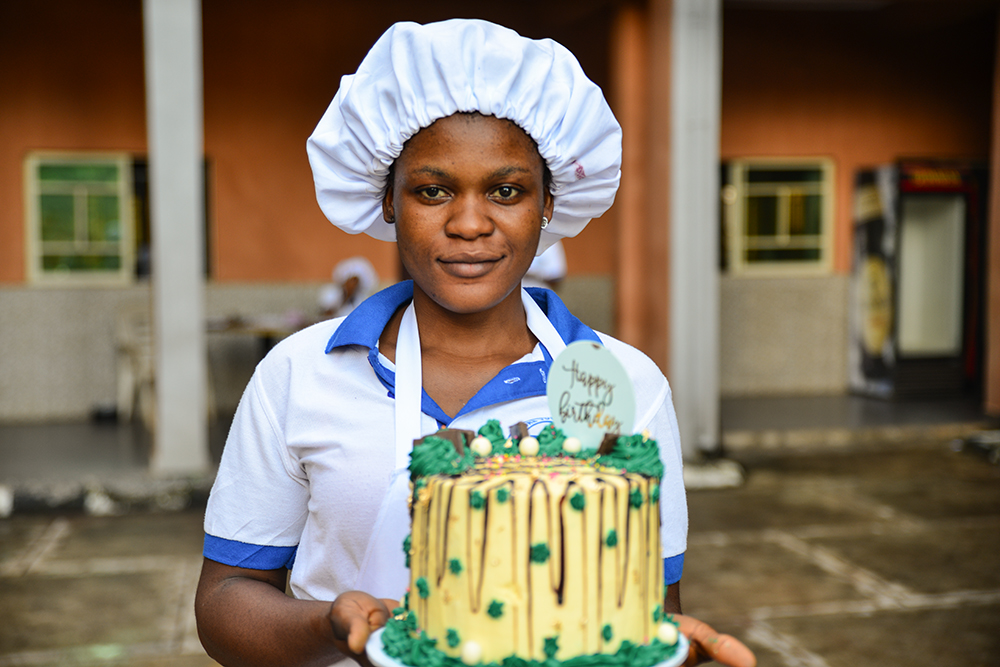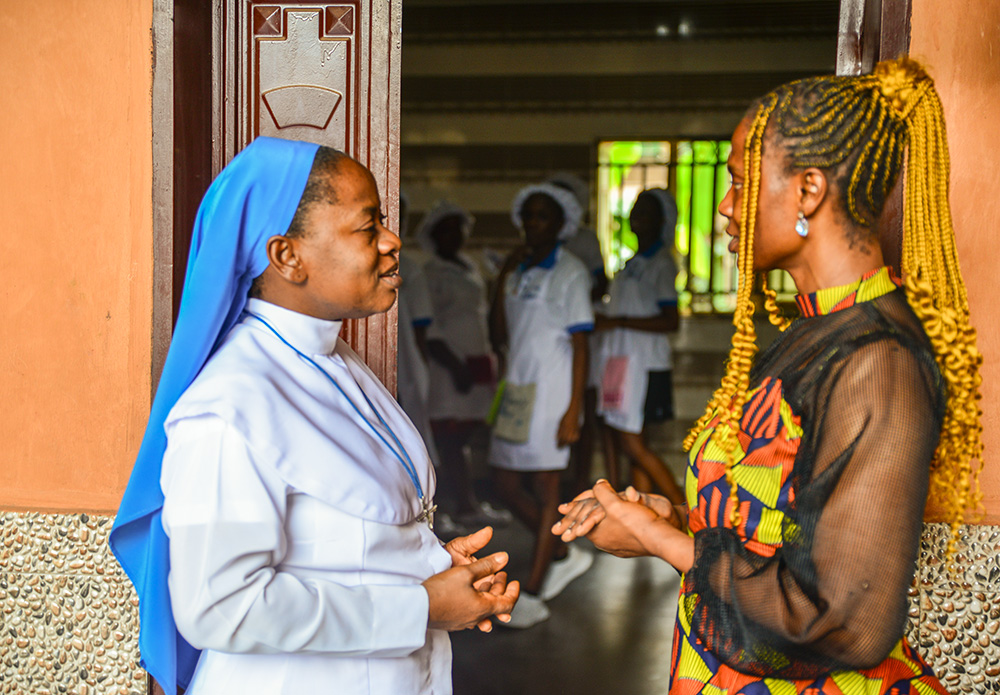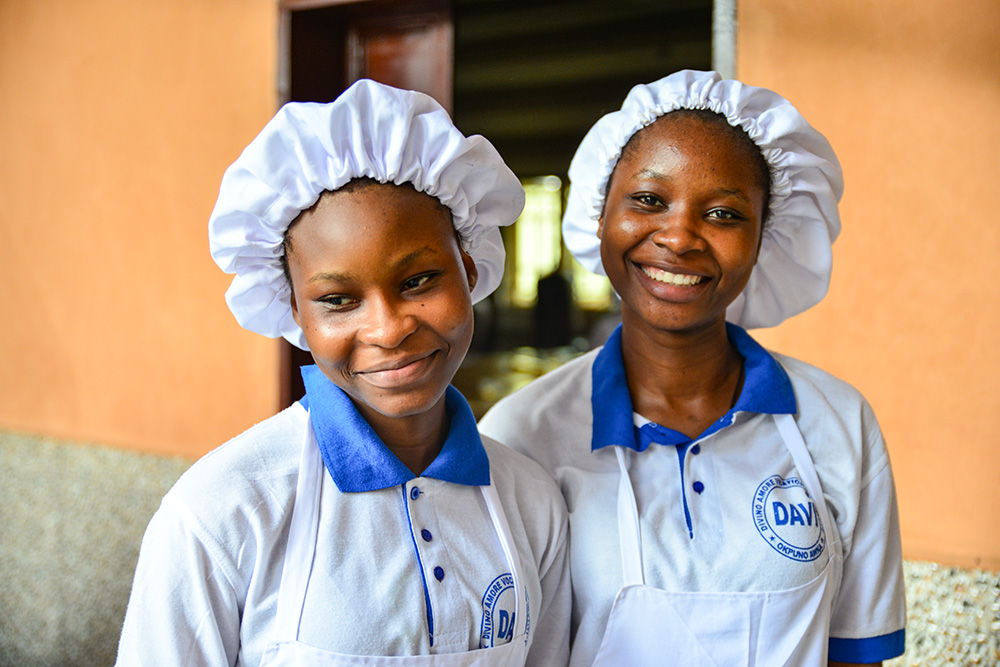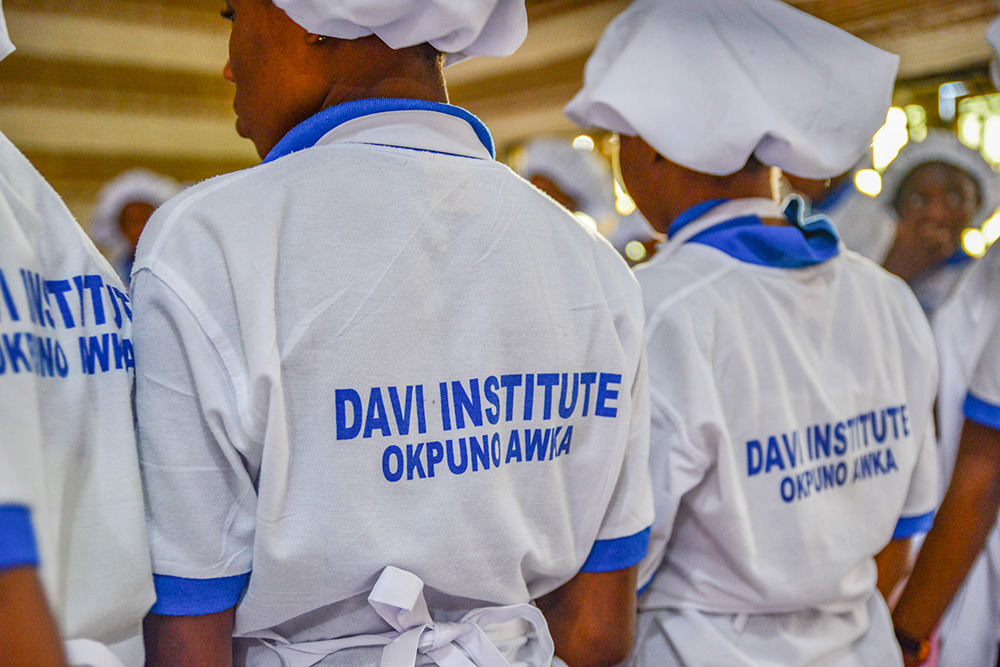
A student at the Divino Amore Vocational Institute in Nigeria holds a cake she made after a baking session. (Patrick Egwu)
Sr. Maria Kamdilichukwu Madubuonwu runs the Divino Amore Vocational Institute, an entrepreneurship center owned and managed by the Daughters of Divine Love congregation in Awka, Southeast Nigeria. Established in 1995, the institute hosts nearly 100 female students seeking to acquire knowledge in entrepreneurship and learn basic skills in baking, catering, graphic design, computer literacy and business education.
"The idea is to equip them with skills, make them self-reliant and financially independent," said Madubuonwu, who works with other sisters at the institute. "We want to use this program to empower people to know it is possible to become financially free and know that you don't have to depend on anyone for handouts."
Last year, Nigeria's unemployment rate stood at 5.39% from 5% the previous year, according to a report by the country's National Bureau of Statistics. With a labor force of 88.94 million persons, 84.15 million were employed. Rapid population growth has outpaced economic growth.
Madubuonwu said the institute, which has trained more than 3,000 students, is stepping up to bridge the unemployment gap by "training new business owners who would employ others."
The institute has several departments. With the food and nutrition department, students learn how to make local and foreign dishes. They also learn how to run and set up their own food and catering businesses to serve different clients.

Daughter of Divine Love Sr. Maria Kamdilichukwu Madubuonwu chats with a tutor at the Divino Amore Vocational Institute in Nigeria. (Patrick Egwu)
The fashion and design department equips the students with how to make new clothes with different designs, while the beauty department teaches them how to do hair, fix nails and apply facial makeup. Madubuonwu said the cosmetology department focuses on providing skills in making soaps, detergents and handwashing liquids.
A newly created department — business mathematics — was launched in 2023 to introduce the students to costing and measurement, according to Alor Kenechukwu, who assists the sisters in teaching at the institute.
"They find it difficult to do most of the measuring aspects of cooking, baking and fashion design. So, we felt we should introduce business mathematics as a course for them," Kenechukwu said. "I advise them that the institute is a place where they can learn life lessons and skills which can also be useful in their homes."
"The fundamental problem for the students is measurements," Madubuonwu said. "When you don't get accurate measurements in sewing and cake making or designing, it may affect your work. We saw that as a problem and decided to do something about it by introducing a course which can provide them with basic measurement knowledge."
Advertisement
The institute runs for two years with a six-month internship preceding the final diploma exams. After acquiring the skills from a chosen department, the students go on to start their own business: a makeup studio, a fashion house, a beauty place or hair salon.
During a visit to the institute on a sweltering Friday afternoon in October 2024, more than a dozen young girls, donning aprons and chef hats, swarmed around a large brown table, learning how to bake cake and make pastries. Favour Ejim, one of the tutors at the institute, was taking the students through a course on how to design a cake.
"You have to apply a lot of creativity to design a cake," Ejim said to the students.
She told Global Sisters Report, "Vocation is harnessing the talent God gave us. They have a lot to give to society with their talents and skills when they leave here."
Learning skills and spirituality
Madubuonwu said spirituality is an integral part of their activities at the institute. Each morning at 6:30 a.m, the students attend Mass at a chaplaincy some 10 minutes away from where they live. In the evening at 7 p.m., they come together to say the rosary. When they return for a new academic term, a priest comes to celebrate Mass for them.
"Instilling spiritual discipline in them is part of our apostolate," she said. "We offer holistic training to everyone who studies here because we want to prepare and help them grow spiritually."
A choir newly formed by Madubuonwu is active at the institute. The students are invited to perform at priestly ordinations or anniversaries.
Madubuonwu said the institute is a home for training women who are able to empower their communities. At the institute, students live in a hostel and visit their families only on weekends or during holidays.
"When you train a woman, you've trained a nation," she said. "If you are able to train a woman very well, she will definitely raise the children very well. So, I think we have the intention of making them better individuals who are able to influence their communities positively."
Jennifer Okechukwu, 24, is a second-year student at the institute learning how to be a professional baker. She said her passion for cooking started when she was 10.
"I have always loved exploring and making new things since I was a kid," she said. "I enrolled here to learn how to bake and cook because I want to be my own boss someday and employ other people."
Okechukwu said her time at the institute has been a learning experience. She noted, "My immediate goal after graduation is to start organizing paid online classes to teach others how to cook, creating new recipes and selling them to make money. I want to start from a small place."
Okechukwu is not alone. Janeth and Jane Onwuama, 19, are twin sisters who enrolled at the institute at the same time. After Janeth finished high school, she decided to learn some skills to enable her to become employable or start her own business. She told GSR she has learned some basic skills in computer operation, baking and cosmetology since she enrolled at the institute two years ago.
"I didn't know these things before coming here so it has been a life-changing experience," she said. "I can bake a cake in one hour."

Janeth and Jane Onwuama, 19, are twin sisters who enrolled in the Divino Amore Vocational Institute in Nigeria at the same time. (Patrick Egwu)
Janeth said she loves graphics designing and wants to establish her own business after graduating from the institute early next year.
"I want to start providing designing services for people and get paid before establishing my own," she said. "I want to be able to provide for myself without depending on others."
Jane said she has had a passion for baking since she was 5. She said this sparked her curiosity to learn the practical aspect of baking. "After graduating, I want to start my own business. I don't want to work for anyone," she said.
Success and challenges
Madubuonwu said she is happy with the quality of students they have trained at the institute because they are "ready to take on the world."
"It's fulfilling when you see them learning, growing and when you see that they are going out from here better than they came in," she said. "After they have left the institute, they still call to give you progress updates about where they are working or how their businesses are doing."
She said companies and local organizations always reach out for recommendations of students for job opportunities in their establishments.
"The skills they learn here translate to employment opportunities for them," she said. "We see them starting their own eatery, employing people, you see companies calling them for work. I'm super proud of the skill and the empowerment they received."
Running the institute comes with some challenges, such as expanding the learning spaces and the lack of stable electricity to power devices like computers and supply water to the hostels and facilities. Madubuonwu said they have plans of expanding the institute to accommodate more students who want to learn skills.

The Divino Amore Vocational Institute in Nigeria has become a home for girls who wish to learn skills in baking, catering, fashion and computer education. (Patrick Egwu)
"Doing all these requires funding but we are not able to do that at the moment due to insufficient funds," she said.
The institute was tuition-free for every student until last year. After a tuition fee of 190,000 naira (about US$125) per annum was introduced, the students had to pay to have access to classes, hostels and learning materials. Madubuonwu said most of the students are currently on scholarships, waiving off the tuition fees burden. Those who pay tuition fees have flexible payment plans.
"There are a lot of things you want to do for them, such as equipping the labs and hiring professional tutors who are always expensive to pay," she said.
She noted that the institute is grateful for the generosity of private donors who sponsor some of the students with tuition fees and equipment they need to start up their businesses after graduation, such as refrigerators and ovens.
Despite the setbacks, Madubuonwu said, "it's a very fulfilling apostolate in as much as it's difficult."
She said she is hopeful for the institute's future prospects. In the next five years, she said she sees the institute becoming a place for professionals to learn skills that will set them up for success in life.
"We are training them not just to acquire skills but to impact society and serve humanity," she said. "When you come out, you will definitely have something important to give to the world."






